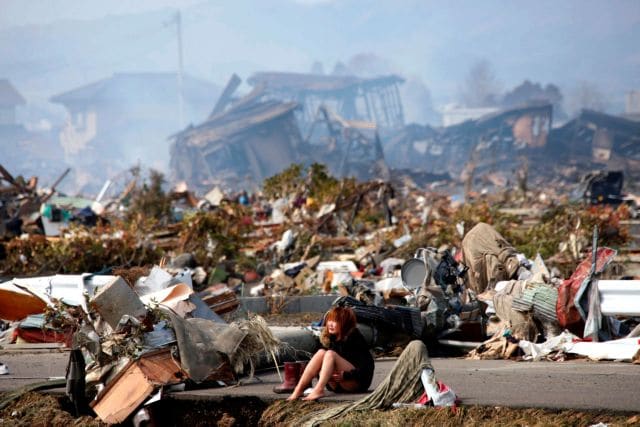"Finally, the day has come," said 70-year-old Yoichi Yatsuda with relief. "I want to live like I used to, even if it's not exactly the same."
He was saying these words as he was preparing to return to his home for the first time in almost 11 years.
It took so long for the Japanese authorities to give the "green light" for the safe return of those who wished to the coastal city of Futaba.
The last "no-go zone" in the Fukushima prefecture, which on March 11, 2011 was hit by a devastating 9 magnitude earthquake, a deadly tsunami and the second largest nuclear disaster in world history, after Chernobyl.
Yoichi was one of about 160.000 locals who were ordered to flee their homes to escape the triple disaster.
Over the past month, authorities have found that radioactivity levels in Futaba were now low enough for people to return home safely for a trial stay.
The normal permit for permanent relocation is not expected to be given before June. And this with reservations.
Nevertheless, 70-year-old Yoichi is looking forward to it.
Together with his wife, they were already transporting a refrigerator and a microwave oven to their old house, which had been deserted all these years, contaminated with radioactivity, but standing up from the then earthquake and tsunami.
Abandoned TEPCO 'dokushin-ryō' (employee dormitory), Futaba, Fukushima.廃墟の東京电影株式会社独身寮、福島県双葉町。 The work of decommissioning the damaged nuclear reactors is far from over. #fukushima #TEPCO #nucleardisaster pic.twitter.com/Ny0V2xeADJ
— CEJ Simons (@cejsimons) March 12, 2021
A "ghost" town
"We are confident that more people can settle in our city, creating an environment that will make returnees feel they have made the right decision," said the mayor of Futaba.
But by the beginning of February, only 19 people from 13 households had applied to participate in the so-called "preparatory overnight program" in their old homes.
The difference is shocking in the city, which before the disaster had 7.140 inhabitants.
Now, at best, the authorities hope that about 2.000 people, old and new, will be relocated.
And this, at a depth of five years after the lifting of the quarantine…
In a survey last year, only 10% of Futaba residents said they wanted to return. The rest are either scared or have lost their homes in the devastating tsunami.
"It is sad," observes Yoichi, who was born in Fatuba, has moved from place to place for the past 11 years and now, in his 70s, longs to return to his hometown.
"I want the authorities to take action," he complains, "to encourage people to come back."
Half… return
45-year-old Juzi Onuma dared it a few days ago, along with his wife and their two minor children. But he did it with half a heart.
His house in Futaba stands alone, surrounded by ruins and empty plots.
He had considered demolishing his own, instead of entering the process of repairs and decontamination by radioactivity.
However, he changed his mind when, after a one-day visit to the city months ago, his 8-year-old son confessed that he wanted to spend the summers there.
"The damage from the nuclear disaster is not always visible," Yuzi told his children as they walked the streets of Fatuba the other day as part of a test stay there.
"Le nucléaire est notre avenir radieux"
Futaba – Fukushima. Zero inhabitant#Chernobyl pic.twitter.com/caZzatbRl2- Jules Balarate (@JBalarate) January 25, 2022
Until 2016, there was a huge sign at the entrance to the city welcoming visitors, with a slogan that Yuzi himself had carved as a student, winning the local competition.
"Nuclear energy is the energy of a bright future," he said.
Today, after everything that happened tragically, the 45-year-old Japanese has a completely different opinion.
The sign no longer exists in the area. It collapsed, because it was in danger of collapsing.
Today, it is on display outside a local museum as a reminder of the Fukushima nuclear disaster.
"I want to believe that it will symbolize the determination not to have another nuclear accident and this time to aim for a truly bright future," Juzi said now.
"I have to tell my kids everything about nuclear power," he says, "including my own student 'mistake.' Maybe this will never happen again "…
in.gr
